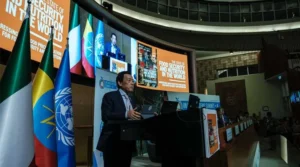GS2 – Governance

Context
The State of Food Security and Nutrition in the World (SOFI) 2025 report by UN agencies highlights persistent issues of wasting, stunting, and anaemia in India, despite a decline in overall undernourishment.
About SOFI Report
- Published by: FAO, IFAD, UNICEF, WFP, WHO.
- Objective: Tracks progress toward SDG 2 – Zero Hunger.
- Key Metrics: Wasting, stunting, anaemia, food insecurity, and hunger trends.
Findings on India
- Wasting (Low Weight-for-Height)
- India has the world’s highest wasting rate: 18.7% (21 million children).
- NFHS-5 reports 19.3% wasting; 7.7% severely wasted.
- South Asia remains the most affected region globally.
- Stunting (Low Height-for-Age)
- 37.4 million Indian children under five are stunted (SOFI 2025).
- Stunting rate: 35.5% in India vs. 21.8% regional average.
- Despite being “on track,” India remains a global hotspot.
- Anaemia (Iron Deficiency)
- 53.7% of Indian women (15–49 years) are anaemic (~203 million).
- NFHS-5: 57% of women and 67% of children under 5 are anaemic.
- India has the highest anaemia burden in Asia.
- Undernourishment
- Undernourished population: 172 million (down from 243 million).
- India makes up 12% of the global undernourished count.
- Prevalence fell from 21% to 16.6% since 2004, but challenges persist.
Causes of Malnutrition
- Maternal Malnutrition: Poor maternal diets impact fetal growth.
- Feeding Practices: Lack of exclusive breastfeeding and delayed complementary feeding.
- Disease Burden: Recurrent infections (diarrhoea, worms) reduce nutrient absorption.
- Poor Sanitation: Unsafe water and open defecation contribute to nutrient loss.
- Nutrient-Poor Diets: Over-reliance on cereals, with inadequate protein and micronutrients.
- Adolescent Pregnancy: Young mothers face higher undernutrition risks.
- Inequality: Gender, income, and regional disparities affect food access.
- Weak Health Systems: Poor counselling, limited supplements, and delayed intervention.
Government Interventions
- POSHAN Abhiyaan:
- Lifecycle approach to reduce stunting, wasting, and anaemia.
- ICDS Scheme:
- Anganwadi centres deliver nutrition, early education, and health support.
- Anaemia Mukt Bharat:
- Provides IFA tablets, deworming, and education for key population groups.
- Food-Based Programmes:
- Mid-Day Meal and PDS schemes distribute fortified and diversified foods.
- Food Fortification:
- Rice, oils, and other staples are fortified with essential nutrients.
- Behaviour Change Campaigns:
- Nationwide efforts on hygiene, infant feeding, and dietary awareness.
- PMMVY:
- Conditional cash transfers for pregnant and lactating mothers to improve maternal nutrition.




